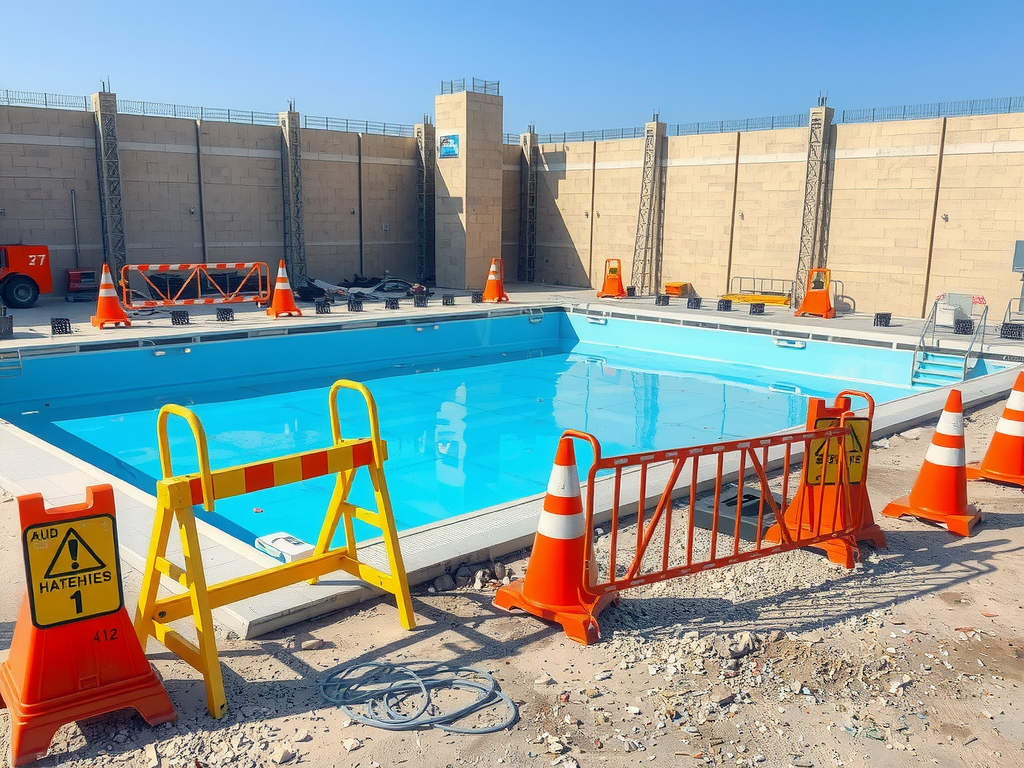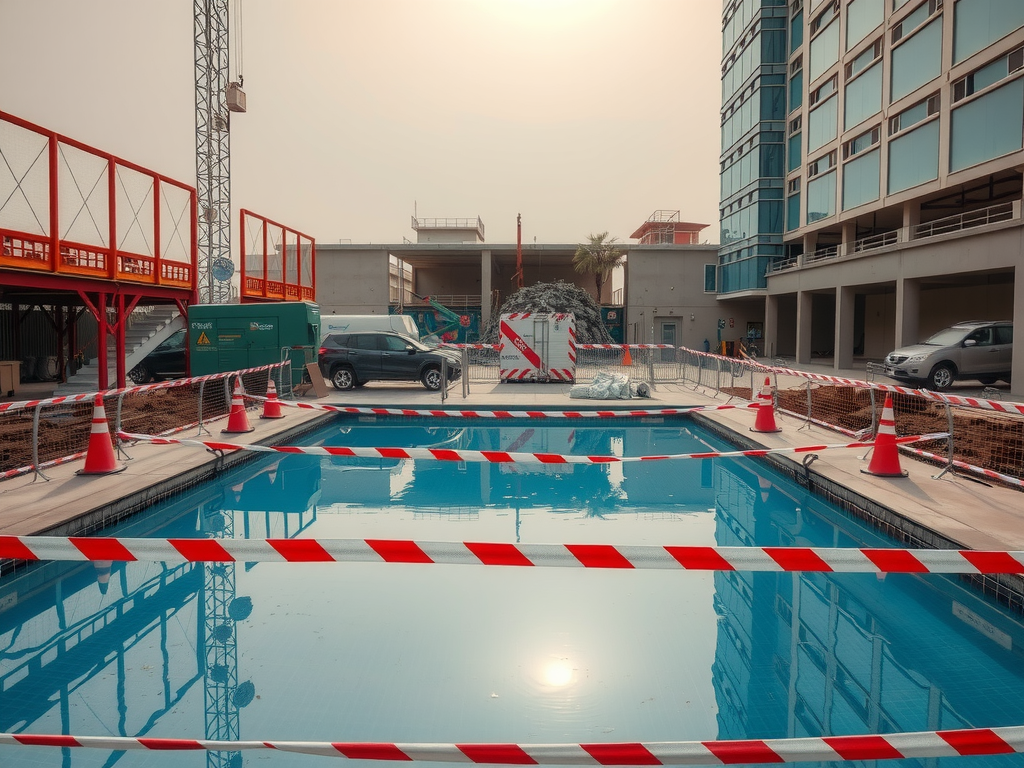
Creating a safe environment is paramount when planning for pool demolition in Fort Worth. A thorough site assessment lays the groundwork for a successful operation.
Before beginning any work, it’s important to evaluate the area carefully, ensuring a comprehensive understanding of excavation guidelines.
Identifying nearby utilities can prevent accidental disruptions.
Maintaining a clean worksite through proper debris disposal is vital for safety and efficiency. All workers should be equipped with the necessary safety gear to minimize risks.
Implementing rigorous worksite precautions protects every team member involved. The use of heavy machinery is often required; thus, ensuring that operators are trained and licensed is imperative.
This proactive approach fosters a more secure demolition experience for all participants.
Click here to learn more about: fortworthpoolremoval.com
Understanding Contractor Safety Measures
Effective management of risks is foundational for a successful swimming pool removal project. Safety protocols play a significant role in keeping team members informed about potential hazards they may encounter.
Regular training sessions ensure contractors stay updated on the latest techniques and equipment.
Proper protective gear, including helmets, gloves, and boots, is not only recommended; it significantly reduces risks on-site.
Local regulations in Fort Worth outline explicit guidelines for safe practices consistent with industry standards. Adhering to these rules is imperative for enhancing worker safety and avoiding penalties.
By prioritizing risk management, contractors safeguard both themselves and homeowners throughout demolition operations.

What Are Key Excavation Guidelines?
Effective excavation practices are fundamental to ensuring both safety and efficiency on construction sites. Structural integrity is directly influenced by thorough preexcavation site analysis, which examines soil conditions.
Identifying underground utilities using specialized tools is vital for preventing unintended disruptions and accidents.
Implementing proper shoring techniques safeguards excavated walls, particularly during pool demolition projects in Fort Worth, Texas.
Training programs for workers enhance awareness, emphasizing the importance of correct equipment usage. Regular safety inspections contribute to compliance with safety standards, which is integral for liability protection and overall site efficiency.
Key Points to Remember:
- Conduct comprehensive pre-excavation analysis that includes considering environmental factors.
- Adhere to local regulations and industry best practices for site cleanup.
Effective Debris Disposal Techniques
Effective management of construction waste is paramount for a sustainable future. Utilizing demolition equipment that emphasizes eco-friendly practices plays a significant role in minimizing environmental impact.
By recycling materials such as concrete and metals, project planning can be executed responsibly, ensuring less waste ends up in landfills.
Local recycling facilities should be engaged to efficiently manage debris and promote community standards through compliance with local regulations.
Partnering with certified disposal services safeguards not only compliance but also supports local ecosystems, especially during pool demolition activities. Evaluate the sustainability of chosen methods regularly, ensuring they align with broader environmental goals.
Safety must remain a top priority; organizing first aid supplies and maintaining rigorous job site management are essential for protecting workers on-site. Adopting these practices contributes to a cleaner, greener Fort Worth, setting an example for responsible waste management.
Essential Worksite Precautions To Follow
Maintaining a safe environment significantly influences the efficiency of a pool removal operation. Regular equipment inspection is necessary to uphold operational standards and minimize potential risks.
A clean worksite not only reduces hazards but also enhances overall workflow.
Workers must consistently clear debris and store tools properly to maintain safety.
Clear access routes for both personnel and machinery are vital. This practice supports effective communication among team members and ensures smooth operations.
Implementing safety signage promotes hazard identification and increases awareness of potential dangers. Proper workforce training is imperative, as it equips employees with the knowledge to follow protocols that foster a safer workplace.
Pool Removal Safety
- Regular equipment inspections can reduce accidents by up to 30%.
- A clean worksite can improve productivity by 20% through reduced hazards.
- Effective communication among team members can decrease operational delays by 25%.
- Proper training can increase adherence to safety protocols by 40%.
Heavy Machinery Usage In Pool Demolition
Effective heavy equipment operation significantly impacts the pool demolition process. Operator training ensures adherence to compliance checks, enhancing safety measures.
Comprehensive training programs increase skill sets and knowledge, effectively minimizing risks involved.
Consistent equipment maintenance is vital to avoid unexpected machine failures.
Regular inspections contribute to the reliability of machinery utilized throughout the project. Conducting site safety checks proactively identifies potential hazards before any demolition work commences.
Open communication among team members fosters operational safety during active demolition. Appointing a site supervisor encourages effective coordination and oversight.
Mandatory use of personal protective gear safeguards everyone on-site.
Routine safety audits of PPE condition are necessary for maintaining worker protection.
Applying these guidelines fosters a safe environment during the entire demolition process.
How To Conduct A Site Assessment
Before starting any demolition work, understanding the environment is imperative for success. A thorough site assessment reveals important elements that impact safety and efficiency.
Commence with an initial site inspection.
Look for uneven ground or overhanging branches that could pose safety risks.
Identify existing utilities, including gas lines and electrical wiring, as these can become hazards during the demolition process.
- Evaluate site conditions: Assess soil stability to prevent erosion and ensure safe trench safety practices. Consider water management practices that safeguard against flooding. Inspect environmental restrictions specific to Fort Worth.
- Existing structure assessments: Examine the pool’s structural integrity. Document construction materials for proper salvage operations during disposal.
- Identification of potential hazards: List unstable surfaces and chemicals that may pose risks during demolition. Review weather conditions that could affect machinery operation.
Performing these steps ensures a comprehensive assessment. Following these guidelines supports a safe and efficient demolition process. Always consider the implementation of perimeter barriers to protect workers and site visitors.
Demolition Safety
- Site inspections can reduce accidents by identifying hazards before work begins.
- Assessing soil stability is crucial, as 75% of trench-related fatalities are due to collapses.
- Proper identification of utilities can prevent costly service interruptions and enhance safety.
- Implementing perimeter barriers can decrease the likelihood of unauthorized access and accidents.
Importance Of Risk Management Strategies
Implementing structured approaches significantly enhances operational safety during pool demolition. Machinery hazards can pose serious threats, making thorough evaluations crucial before commencing work.
Safety meetings foster a culture of injury prevention, reinforcing the importance of following established protocols.
Job safety analysis plays a fundamental role in assessing site-specific risks, ensuring teams are well-prepared for challenges.
Fall protection is indispensable, safeguarding workers in high-risk environments as they navigate the removal process. Effectively creating and executing management plans empowers construction teams to prevent accidents, ultimately improving safety and efficiency throughout pool demolition services in Fort Worth.
Homeowner Guidance For Safe Pool Removal
For homeowners contemplating a pool removal project, understanding the necessary precautions is vital. Safety measures should remain the focus throughout the procedure.
Before commencing, ensure adequate ground stabilization to mitigate risks and prevent accidents.
Engage with a reliable contractor familiar with local regulations specific to Fort Worth for compliance.
Discuss access routes for heavy machinery to minimize disruption in your neighborhood. Implementing controlled demolition techniques will significantly help manage potential risks effectively.
Consult local ordinances to avoid fines and delays, ensuring a smooth process. Address noise concerns with neighbors proactively to maintain positive relationships during the removal.
Overall, careful planning fosters a seamless and secure pool demolition experience.
Pool Removal Safety
- Proper ground stabilization reduces the risk of accidents during pool removal.
- Hiring a contractor familiar with local regulations ensures compliance and avoids legal issues.
- Controlled demolition techniques minimize risks and enhance safety during the removal process.
- Proactively addressing noise concerns helps maintain good relationships with neighbors throughout the project.
Fort Worth Pool Removal Reviews That Matter
Backyard Renovation After Pool Removal Transforms Your Fort Worth Space
